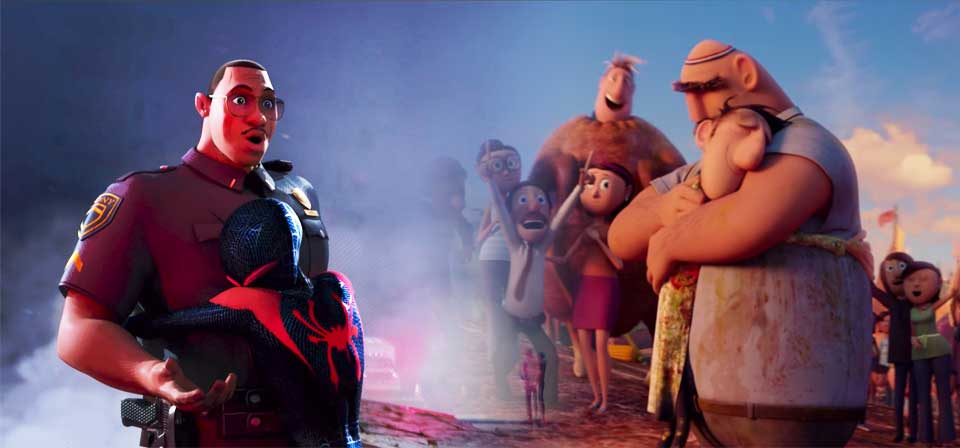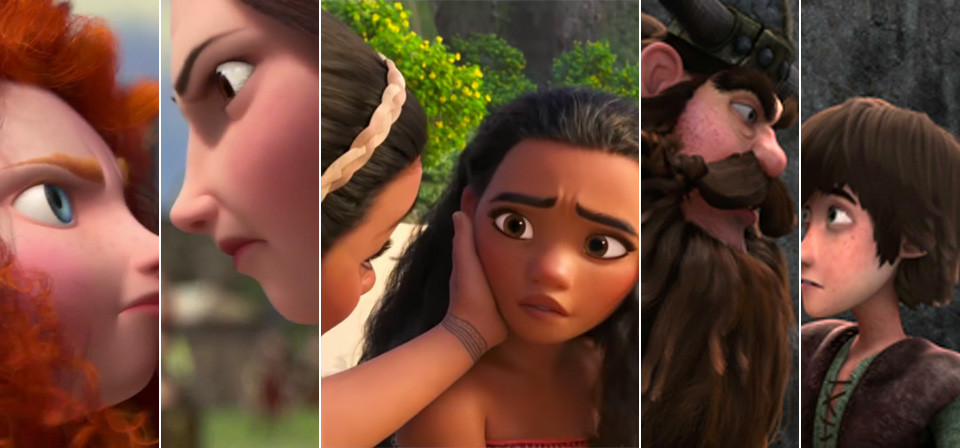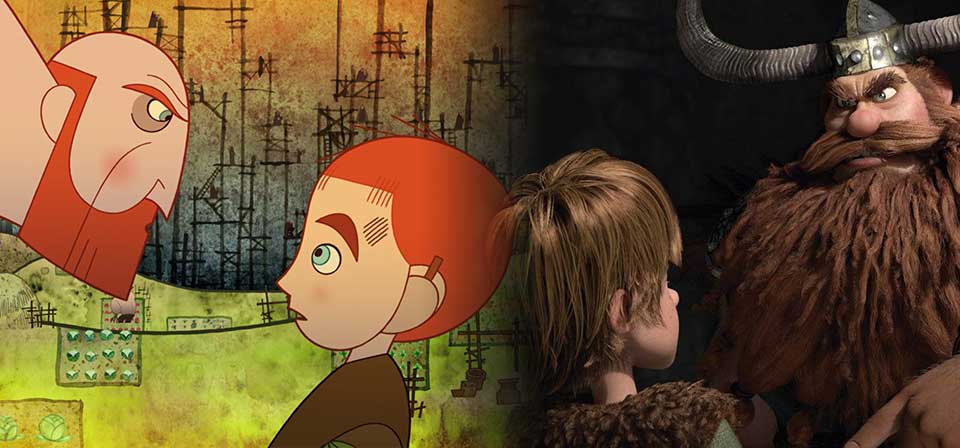Mother knows best: Turning Red, Encanto, and Disney/Pixar’s new overbearing moms
The familiar animation trope of the domineering dad and the (sometimes) supportive mom gets an update in recent films from the Mouse House.
A decade or more ago, if the protagonist of an animated film had a disapproving, overbearing, or blinkered parental figure with overly restrictive ideas about their offspring’s life, that parent was usually the father. Domineering dads were a notable trope of the 1990s Disney renaissance, from King Triton in The Little Mermaid to Tarzan’s grumpy ape father Kerchak. Over the last couple of decades, variations on the theme ran through films from DreamWorks (Kung Fu Panda, How to Train Your Dragon), Sony Animation (Cloudy With a Chance of Meatballs, Hotel Transylvania), and others (Happy Feet, The Secret of Kells).
While some of these difficult dads are more benign than others, in nearly every case the father is a functional antagonist to the young hero, who must defy parental expectations or restrictions in order to find fulfillment or authenticity — often in the process saving the community, and nearly always winning the chastened father’s belated approval. Thirteen years ago I dubbed this trope “Junior Knows Best,” and it’s only accelerated since then.
As for mothers, on the comparatively rare occasions when they aren’t literally or functionally absent, they’ve often been cast in mediating roles between father and offspring. Recently, though, Disney/Pixar has taken to flipping that script.
Pixar’s new Turning Red is the latest example of an increasing shift to overbearing maternal figures, from young Mirabel’s and Miguel’s domineering abuelas in Encanto and Coco to middle-aged Joe Gardner’s loving but controlling mom in Soul. Antecedents for this trend of mothers as functional antagonists include Merida’s demanding mother Queen Elinor in Brave and Tangled’s actually villainous Mother Gothel, whose showstopper “Mother Knows Best” offers an apt label for the new trend. (An ironic label, certainly, contrasting with the literalness of Junior Knows Best, but I’ll just have to live with that.)
In Turning Red, Meilin “Mei Mei” Lee (Rosalie Chang), a 13-year-old Chinese-Canadian girl living in Toronto in 2002, comes from a long line of tightly controlled and controlling maternal figures, including her tiger mom Ming (Sandra Oh) and her grandmother (Wai Ching Ho) as well as a half dozen aunts. Co-written and directed by Chinese-Canadian filmmaker Domee Shi, it’s Pixar’s first feature from a woman directing solo as well as Shi’s first feature film after the Oscar-winning short Bao (also about a problematic mother-child relationship).
Maternal perfectionism and youthful bravado
Like Queen Elinor in Brave and Abuela in Encanto, Mei’s mother Ming is a rigid perfectionist with endless expectations: a dynamic unique to these mother-daughter relationships. Overbearing fathers tend to be lawgivers with one great rule (don’t go out on the ocean / near the surface world; monsters / humans are the enemy; etc.). Daughters with overbearing mothers, by contrast, are held to endlessly exacting standards of perfection — and those who are deemed lacking, like Mirabel, had better keep out of the way.
When Mother knows best, it’s Father who’s either absent or perhaps (as in Brave and especially Turning Red) in some way between mother and child. (In Coco, alas, both of Miguel’s parents passively enable Abuelita, tacitly supporting her ban on music and her expectation that all Riveras will be shoemakers and certainly not musicians. On the other hand, Mirabel’s parents in Encanto are more supportive, affirming her and advocating for her with Abuela. For a recent example of full-on Junior Knows Best in which both parents try to thwart the young hero’s growth while chill Grandma knows what’s up, see Pixar’s Luca.)
Turning Red, like Encanto, begins with a bit of high-spirited misdirection. In opening voiceover, Mei puts explicit qualifiers on the Fourth Commandment: Honoring your parents, she says, is her family’s No. 1 rule, but “if you honor your parents too much, you might forget to honor yourself. Fortunately,” she adds saucily, “I don’t have that problem.” Mei proceeds to introduce herself as a boisterous free spirit who follows her own path — though it’s soon apparent that behind this maverick self-image is an “overachieving dork” who is deeply invested in living up to her mother’s expectations and feels guilt and shame at every perceived failing or potential disappointment. Not only is this a clever inversion of the standard approach of establishing up front the conflict between parental expectations and the protagonist’s desires or interests, it’s also a shrewd bit of characterization: Mei has internalized Ming’s expectations to the point that she’s convinced herself that she marches to her own unconventional drumbeat even as she does her best to dance to her mother’s demanding tune.
Mirabel likewise brings a blithe spirit to the opening of Encanto, belting out a buoyant establishing song introducing the wonders of her special family, the Madrigals, and the various magical powers given to each member. Mirabel’s love for and pride in her family are real, but the song’s celebratory tone belies her hidden pain: not so much that she, alone of her family, inexplicably wasn’t given a gift (or at least not only that) as that Abuela seems to devalue her because of it. It’s one of Encanto’s grace notes that when Mirabel bravely asserts that she’s happy as she is and is as special as any member of her family, she’s echoing the reassuring messaging from her loving parents — but if she doesn’t necessarily quite believe what she’s saying, it’s because of the messaging she gets from Abuela.
Humanizing problem parents
In Turning Red, the magic is viewed as a curse rather than a blessing, and when it strikes Mei it’s completely unexpected and unwanted. One day after Ming’s protectiveness leads to a brutal humiliation, Mei wakes up, to her horror, as a giant red panda. Unwelcome physical transformations have become a familiar convention (see especially Brave as well as The Princess and the Frog, Soul, and Luca), but Turning Red’s riff on the trope is particularly expressive. First, obviously, it evokes the confusion and shame that often accompanies puberty: a theme made explicit by Ming, who thinks her daughter’s secretiveness and distress may denote the onset of menstruation. On the other hand, Mei’s Bruce Banner–like ability to suppress the beast and remain human by maintaining Zen-like calm suggests the pressure she feels to keep volatile emotions bottled up and hidden away — like her secret notebook with hormonally charged sketches featuring her secret crush and her favorite boy band. And when Mei learns that her strange power comes with social advantages, it’s like any young introvert discovering a hidden talent that makes them a hit at parties.
Turning Red feels in some ways like a mirror image of Brave, Pixar’s first film with a woman writer-director, Brenda Chapman (though Chapman wasn’t allowed to finish the film, which was reworked and completed by Mark Andrews). Where Chapman was inspired by her relationship with her daughter, Shi drew on her childhood relationship with her mother. Where Merida accidentally transforms her mother into a bear, Mei’s panda problem comes from her mother.
In an important way, on the other hand, Turning Red follows Encanto in developing a new spin on the Junior/Mother Knows Best trope: In these cartoons, for the first time, the roots of the maternal figure’s rigidity in her own youthful struggles or trauma are explored, and rapprochement between mother and daughter turns on the daughter empathizing with the mother’s experiences and coming to see her as someone not so different from herself. This approach to humanizing the overbearing parental figure hasn’t been seen before — not even in Brave (as relatable as Elinor is, we learn nothing about her background) or in Coco (where the trauma is not Abuelita’s, but two generations prior, and the emotional climax turns on connecting emotionally with Miguel’s great-grandmother).
Turning Red goes beyond Encanto and earlier films, moreover, in suggesting that every generation struggles with the baggage of previous generations, and too often winds up passing it on to the next generation — a cycle that can be broken through mutual understanding between generations. (Coco acknowledges that baggage is passed down, but Abuelita never struggles with it, nor for that matter does Miguel, who never internalized it in the first place.) Encanto’s characters are thinly drawn and its conflict is overly schematic; its emotional power resides significantly in Lin-Manuel Miranda’s lyrical virtuosity and musical flair. Turning Red is more conventional conceptually and visually (Casita, the Madrigals’ anthropomorphic house, might be Disney’s most memorable mute sidekick, and as a setting ranks close behind the Beast’s enchanted castle), but its characters and emotions are richer and messier.
Spiritual and emotional frankness
Turning Red also richer and messier spiritually, which is a mixed bag. Encanto, like Coco and Luca, has the thinnest possible patina of Catholicism (with a village priest among the crowd of minor characters). Instead of referring to magic, Abuela talks constantly of the family’s “miracle,” a secularized reference to the paranormal MacGuffin: an undying candle somehow imbued with supernatural power in Abuela’s youth by the sacrificial death of her young husband at the hands of unspecified marauders. The candle is somehow the source of the specialness of the house and its inhabitants; it’s also the ambiguous focus of prayer-like moments. (In one scene Mirabel could be praying to the heavens or to the power of the candle. In another, Abuela seems to address the spirit of her husband in or through the candle.)
The franker spirituality in Turning Red includes elements of Confucianism and Wuism. The Lee family’s ancestral temple (the oldest such temple in Toronto, we’re told) is both a public attraction and a house of prayer. “Instead of honoring a god,” we’re told, “we honor our ancestors.” Yet their most revered ancestor prayed to gods in a time of war and became the “guardian of the red panda,” with panda power that’s been passed down to Mei. (Another point of contact: As in Encanto, the supernatural element goes back to a time of mass violence. This time, though, behind the “miracle” is an identifiable power.) In recent generations, the women of the family all take part in a coming-of-age ritual, overseen by a “shaman,” in which their inner red panda is exorcised. In an extended visionary sequence reminiscent of the ancestral-plane sequences in Black Panther, Mei apparently encounters her great ancestor, the original “guardian of the red panda.”
Compared to prior Disney/Pixar films, Turning Red is also franker about the emotional as well as the physical side of adolescence and puberty (a topic that’s mostly been the subject of glancing, adult-oriented jokes in movies like Inside Out). There’s nothing new about Mei’s crush on a convenience-store clerk or her boy-band obsession, but the childish, swoony drawings in her notebook are like a field guide to her soul: muscular male torsos and soulful, anime-influenced portraits of herself and her crush, often blended with fantasy elements (e.g., her crush appearing as a merman or a centaur). Mei’s burning shame when Ming discovers the notebook, to say nothing of what she does with it, carries the universal sting of everyone’s most humiliating middle-school memory. For that matter, so does another scene involving sanitary pads (surely another first for Hollywood animation, along with the twerking). While Ming’s extreme behavior (e.g., stalking Mei at school) is sometimes over the top, its effect on Mei feels emotionally honest and true to life. It’s also worth noting that Mei’s father Jin (Orion Lee) plays a quietly supportive role in his daughter’s life, not unlike Mirabel’s parents. (Jin also cooks.)
While the Junior Knows Best trope shows no sign of fading, the recurring inclusion of positive parental figures, along with increasing empathy for even overbearing parents and exploration of the life experiences that shape their attitudes and behavior, are welcome developments. And, in an odd way, switching up the familiar parental overbearing/understanding roles can have humanizing implications for both fathers and mothers. Moms, like dads, are only human, and dads are, in a different sense, no less human than moms.
Related

Fathers know best? Phil Lord and Chris Miller’s surprising animated dads
Particularly striking to me, and even moving, is a theme connecting Cloudy With a Chance of Meatballs and Spider-Man: Into the Spider-Verse (though not The Lego Movie): how themes of father–son conflict ubiquitous in other cartoons play out with unexpectedly insightful, consequential fathers.

Junior Knows Best: We need to talk about cartoon parents
I don’t expect animated heroes to have uniformly ideal, harmonious family lives. It’s not realistic — and it doesn’t make for good drama, which needs conflict. The ubiquity of the pattern, though, is striking.

Junior Knows Best
In theaters right now are two charming and visually engaging animated films at opposite ends of the budget spectrum, different in many respects but with some interesting overlap as well. One is How to Train Your Dragon, DreamWorks’ big-budget CGI adaptation of a popular children’s book. The other is The Secret of Kells, an Oscar-nominated Irish animated indie made on a comparative shoestring budget, now in limited release.
Recent
- Benoit Blanc goes to church: Mysteries and faith in Wake Up Dead Man
- Are there too many Jesus movies?
- Antidote to the digital revolution: Carlo Acutis: Roadmap to Reality
- “Not I, But God”: Interview with Carlo Acutis: Roadmap to Reality director Tim Moriarty
- Gunn’s Superman is silly and sincere, and that’s good. It could be smarter.
Home Video
Copyright © 2000– Steven D. Greydanus. All rights reserved.